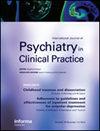Validation of the Turkish version of the self-evaluation of negative symptoms scale (SNS)
IF 2.9
4区 医学
Q2 PSYCHIATRY
International Journal of Psychiatry in Clinical Practice
Pub Date : 2022-06-14
DOI:10.1080/13651501.2022.2082985
引用次数: 2
Abstract
Abstract Objectives The Self-Evaluation of Negative Symptoms Scale (SNS) is a self-report scale that evaluates a patient’s subjective experience on all five domains of the negative symptoms. This study aimed to present the adaptation and validation study of the Turkish version of SNS(SNS-TR). Methods Seventy-five patients and 50 controls were recruited for this study. After the approval of the translation, participants were asked to fill out SNS-TR by themselves. They were interviewed with the Brief Negative Symptoms Scale (BNSS), Positive and Negative Syndrome Scale (PANSS), and Calgary Depression Scale for Schizophrenia (CDSS). Results SNS-TR showed good internal consistency in the reliability analysis with Cronbach’s alpha= 0.873. Subscale-total score correlation coefficients were significant (p < 0.01). In the validity analyses, the total and subscale scores of SNS-TR showed positive correlations with the total and subscales of BNSS, with only one exception of BNSS lack of distress subscales. The total score of SNS-TR demonstrated a significant correlation with PANSS-total, PANSS-negative subscale, PANSS-general subscale, and CDSS scores. Confirmatory factor analysis showed acceptable values for the five-factor structure, similar to the original version. Conclusion To conclude, our study indicates that SNS-TR is an easily applicable self-evaluation tool with good psychometric properties for assessing negative symptoms. KEY POINTS SNS is a novel and easily applicable self-report scale for examining negative symptoms in schizophrenia patients, allowing them to evaluate their subjective experience on all five domains of the negative symptoms. It shows good internal consistency (α= 0.873) which is similar to the original version (α = 0.867). Confirmatory factor analysis scores were found in acceptable ranges and SNS-TR confirm the five-factor structure. Using this scale in clinical practice would empower both the physician’s examinations and patient participation through treatment and follow-up course.土耳其版阴性症状自评量表(SNS)的验证
摘要目的阴性症状自评量表(SNS)是一种自我报告量表,用于评估患者在阴性症状的所有五个领域的主观体验。本研究旨在介绍土耳其版SNS(SNS-TR)的适应和验证研究。方法本研究共招募75名患者和50名对照者。翻译批准后,参与者被要求自己填写SNS-TR。他们接受了简短阴性症状量表(BNSS)、阳性和阴性综合征量表(PANSS)和卡尔加里精神分裂症抑郁量表(CDSS)的访谈。结果SNS-TR在信度分析中表现出良好的内部一致性,Cronbachα=0.873。亚量表总分相关系数显著(p < 在有效性分析中,SNS-TR的总分和分量表得分与BNSS的总分和量表呈正相关,只有一个例外,即BNSS缺乏痛苦分量表。SNS-TR的总分与PANSS总分、PANSS阴性分量表、PANSS一般分量表和CDSS得分显著相关。验证性因子分析显示五因子结构的可接受值与原始版本相似。结论总之,我们的研究表明,SNS-TR是一种易于应用的自我评估工具,具有良好的心理测量特性,可用于评估阴性症状。关键点SNS是一种新颖且易于应用的自我报告量表,用于检查精神分裂症患者的阴性症状,使他们能够评估他们在阴性症状的所有五个领域的主观体验。它显示出良好的内部一致性(α=0.873),与原始版本(α = 0.867)。证实性因素分析得分在可接受范围内,SNS-TR证实了五因素结构。在临床实践中使用该量表将使医生的检查和患者在治疗和随访过程中的参与成为可能。
本文章由计算机程序翻译,如有差异,请以英文原文为准。
求助全文
约1分钟内获得全文
求助全文
来源期刊
CiteScore
6.00
自引率
3.30%
发文量
42
审稿时长
>12 weeks
期刊介绍:
International Journal of Psychiatry in Clinical Practice provides an international forum for communication among health professionals with clinical, academic and research interests in psychiatry.
The journal gives particular emphasis to papers that integrate the findings of academic research into realities of clinical practice.
Focus on the practical aspects of managing and treating patients.
Essential reading for the busy psychiatrist, trainee and interested physician.
Includes original research papers, comprehensive review articles and short communications.
Key words: Psychiatry, Neuropsychopharmacology, Mental health, Neuropsychiatry, Clinical Neurophysiology, Psychophysiology, Psychotherapy, Addiction, Schizophrenia, Depression, Bipolar Disorders and Anxiety.

 求助内容:
求助内容: 应助结果提醒方式:
应助结果提醒方式:


